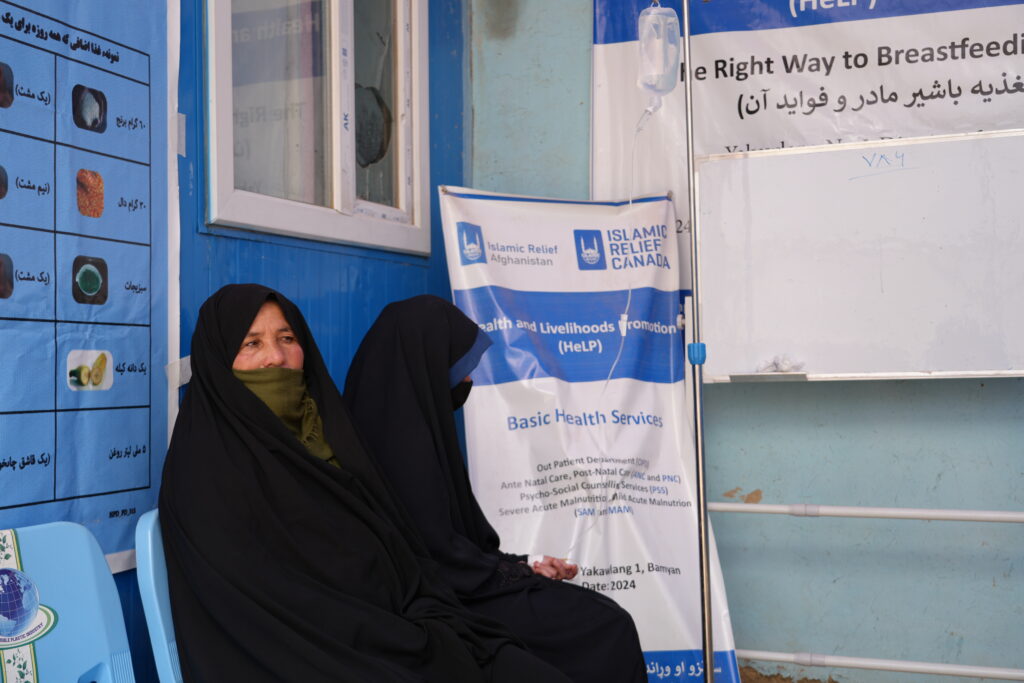
What would you do if your child needed urgent medical care, but the nearest clinic was an exhausting hour-and-a-half’s walk away? Would you risk the journey in the rain, through snow, harsh mountain winds or scorching sun? Would you carry a sick child in your arms in the hopes of getting there safely?
In Lailour Pain village, a remote part of Yakawlang district in Afghanistan’s Bamyan province, these questions were once part of everyday life. For Khadija and many other mothers, accessing healthcare was an uphill battle. But all that is changing now.
Living with uncertainty
Khadija, 45, has spent her entire life in Lailour Pain, a village her family has called home for generations. Together with her husband, Abdullah, she cares for a large family of 14: 3 sons, 4 daughters, 2 daughters-in-law, and 3 grandchildren.
“My husband is 58 and works as a farmer. Our income comes from the crops we grow on our farm. If the crops grow well and there is enough water, we manage. But if there’s a drought, we have nothing. It becomes very difficult to survive.”
The family’s modest 4-room mud house provides shelter but lacks the comfort and warmth of a proper home. They struggle with poor harvests year after year, leaving them with no choice but to purchase food from Yakawlang city, around 20 kilometers away — a journey that is both expensive and physically demanding. Access to clean drinking water remains limited, with the family relying on a shared community well from which they must draw water each day by hand. While Khadija’s daughters are continuing their education at a nearby primary school, access to even the most basic health services has always been out of reach for the family.
A new beginning for the community
In September 2024, with support from the Health and Livelihoods Promotion (HeLP) project, Islamic Relief built a clinic in Khadija’s village. Every day, the facility serves around 100 patients, not only from Lailour Pain but also from several neighbouring villages who previously had no access to nearby healthcare.
For family’s like Khadija’s, the new clinic has been life-changing.
“My eldest daughter, who is 25, has kidney problems and needs regular medical attention. Before, it was a long journey to get her help,” Khadjia says. “We had to walk for an hour and a half to reach the nearest health centre.
“It was very tiring. I have back pain myself, and making that journey was hard.”
Many villagers, especially mothers and elderly people, were unable to make the long trip. Even when they did, there was no guarantee that the clinic would have the medicine they needed. Illnesses, particularly among children, went untreated. Health education was non-existent.
“There were times we had to cut back on food just to afford a trip to the city for medical treatment. It was painful, especially in winter,” Khadija recalls.
The new clinic offers a wide range of services: outpatient consultations, antenatal and postnatal care, psychosocial support, and nutrition programmes. Children who need specialised care are referred for treatment, and families receive counselling on hygiene and wellbeing.
For months, Khadija lived with chronic back pain. Even simple chores like cleaning and cooking became a struggle for her. After visiting the clinic, she received pain relief medication and advice on how to manage her condition at home.
“It changed our lives,” Khadija says quietly. “Now, when we’re sick, we go to the clinic nearby. We receive medicine, guidance, and care. I feel better, and I can do my daily chores without pain.”
Women in the village, who once hesitated to seek care, now feel safe and confident visiting the clinic. Health awareness has also improved, and with it, the overall quality of life has improved.
Khadija emphasises the importance of expanding the services. “We need delivery care. Complications during childbirth are common, and these services would save lives.”

A mother’s wish
For Khadija, the clinic is more than a health centre—it’s a promise of a brighter future.
“I want my children to be healthy. I want them to study, grow, and have better lives than we had. This clinic gives me hope that it’s possible.”
She sits quietly, her dark green and black shawl wrapped tightly around her shoulders, her voice soft but steady. “We are thankful to Islamic Relief. What you’ve done here has changed our lives.”
Across Afghanistan, countless families like Khadija’s continue to face major challenges in accessing basic healthcare. Long distances, poverty, and a lack of local services put lives at risk, especially for women and children. With your support, Islamic Relief is working to change that by building clinics, training staff, and delivering life-saving care to some of the most remote communities.
Please help Islamic Relief continue to deliver life-saving health services and hope to families like Khadija’s in Afghanistan and around the world. Donate now.



